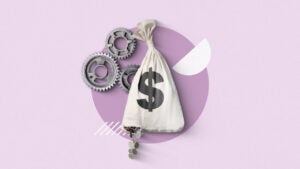What is business collateral?




Key takeaways
- Collateral can make loans less risky for the lender since the assets can be seized if borrowers don’t repay their loans.
- Collateralized loans are generally easier to get and come with more favorable terms than unsecured loans.
- Some lenders may require a personal guarantee in addition to business collateral.
Being able to access financing when needed is critical for small business owners. More than half of small businesses sought some type of financing in 2024, according to that year’s Small Business Credit Survey. If you’re a new business owner who hasn’t developed a lengthy credit history however, or you have poor credit, you may be wondering whether it’s possible to obtain a business loan.
The good news is that there are lenders willing to work with businesses facing these challenges, but they may require collateral in order to approve a loan. Even in cases when you don’t have credit challenges, using collateral can be beneficial to help you obtain a more competitive business loan and reducing your out-of-pocket costs.
What is collateral for small business loans?
Collateral for a small business loan is an asset or assets that a business owner promises to hand over to a lender if they fail to repay the loan. Collateral acts as security for the loan, which is why these types of loans are sometimes called secured business loans. Unsecured loans don’t require collateral.
When you provide collateral for business loans, you reduce the risk that a lender will have to go away empty-handed. Since the lender has this assurance, it’s more likely to approve a loan and may even offer better rates and longer repayment terms. Collateral can even help business owners with bad credit qualify for a loan.
Not all business loans require collateral. Examples of loans that typically come with this requirement include:
- Small Business Administration loans of more than $50,000
- Secured business loans
- Equipment financing
- Traditional business term loans
How business collateral works
There are several things to know about using collateral to secure a loan:
- Lein agreements: When you sign closing documents on your loan, you will sign a lien agreement for the asset you use as collateral. This agreement clarifies the lender’s right to your property to recoup their losses if the loan goes unpaid. The collateral will remain in your possession as long as you stay current on your loan payments.
- Collateral amounts: Lenders generally want enough collateral to offset 100 percent of what you are asking to borrow. If you use real estate as your collateral business asset, for example, your property value will need to be equal to or greater than the loan amount.
- Stability: Lenders will consider the stability of an asset’s value when considering it for collateral. For instance, vehicles depreciate quickly, while real estate tends to appreciate over time.
- Marketability: Marketability and transferability also factor into assessed value. Lenders prefer assets that would be easy to offload if necessary.
- Overdue payments: If you need to catch up on payments, your lender is likely to contact you before repossessing your collateral. Once your loan is fully paid, your lender should provide you with a lien release, relinquishing any rights they had to the property under the conditions of the loan.
Pros and cons of business collateral

Pros
- Potential to qualify for a collateralized loan even in cases when you have fair or bad credit
- Collateral may lower the loan interest rate or improve repayment terms
- May provide access to a larger amount of funding

Cons
- Loan application may take longer to process due to collateral assessment
- Risk of losing valuable asset or collateral if you default on loan
Collateral vs. personal guarantee
Collateral in business loans refers to business assets or things your company owns. But if your business doesn’t have sufficient assets to serve as collateral, or if the lender just wants an extra safeguard built in, they might ask for a personal guarantee.
A personal guarantee means the lender can pursue not just your company for repayment but also you personally and can seize your personal assets if you default.
Types of business loan collateral
Here’s a look at some common types of business collateral used to obtain a loan.
Real estate
If your business owns real estate, this can serve as collateral when you borrow. This type of asset may include a home office, other buildings or land belonging to the company. Real estate is typically a strong form of collateral to offer because of its sizable and stable value.
Business equipment
Many types of equipment and machinery can fall under this umbrella, including office equipment, semi trucks and heavy machinery.
Lenders may be picky about this form of an asset as collateral: the older or more heavily used your equipment is, the less value it has to a lender. Similarly, if your equipment is unique to your industry and would be difficult for your lender to offload, it may be less valuable as loan collateral.
If you get an equipment loan, the equipment you’re buying will usually serve to collateralize the loan.
Inventory
Unsold inventory can serve as loan collateral for your business. Especially if you operate in the retail sector, you may find this a valuable type of business asset to offer. As with specialized business equipment, lenders may consider certain kinds of inventory to be more desirable than others, so keep in mind that your valuation may differ from your lender’s.
Investments
If your business owns any stocks, bonds or other investments, these are generally considered strong collateral. Like cash, these assets are easy to value and liquidate, so they are ideal if you can tolerate the risk of using them to secure your loan.
Cash
Only some lenders will consider cash as loan collateral, but it is the most straightforward asset you can offer. If your business keeps its cash assets in business bank accounts like checking and savings, acquiring documentation should be easy.
Invoices
When you use an invoice financing company, you are securing a loan using unpaid or outstanding invoices. This type of business loan can be costly, and you will miss out on the chance to get full value for your unpaid invoices. But this is a fast way to secure financing, saving you from waiting 30, 60 or 90 days for an invoice to get paid.
Blanket lien
A blanket lien is appealing for lenders but very risky for borrowers. This type of collateral in business loans can give your lender broad authority to seize multiple assets if your loan goes unpaid, sometimes up to or including all of your business assets.
What to do if you don’t have collateral
If your business doesn’t have anything that could serve as collateral — or you just don’t want to put anything on the line in case you can’t repay what you borrow — you have other options:
| Loan type | Description |
|---|---|
| Unsecured business loans | These loans don’t get secured by collateral. They may come with higher rates or shorter repayment terms and might even require a personal guarantee. |
| Unsecured business lines of credit | These loans operate as a revolving line of credit, similar to a business credit card. You only pay interest on the portion of the credit that you are currently using. |
| Business credit cards | Business credit cards usually don’t require collateral and come with features like grace periods and rewards for purchases. |
| Invoice factoring | Similar to invoice financing, but instead of a loan, you sell your outstanding invoices to an invoice factoring company |
| Merchant cash advances | These cash advances get repaid with future sales from your business, so lenders usually care more about past sales than collateral. |
Bottom line
What is collateral in business? It’s something you put on the line that your lender can seize if you don’t repay your business loan.
If you can tolerate the risk of potentially losing assets, offering business collateral can be a great way of qualifying for a loan you may not otherwise be able to secure. Plus, because lenders take on less risk with secured loans, they may offer better interest rates and repayment terms in exchange for the lien on your collateral.
Frequently asked questions
Why we ask for feedback Your feedback helps us improve our content and services. It takes less than a minute to complete.
Your responses are anonymous and will only be used for improving our website.
You may also like

How to get a first-time business loan

What is a startup business loan? How does it work?

How to get an unsecured business loan

What is an unsecured business loan and how does it work?
